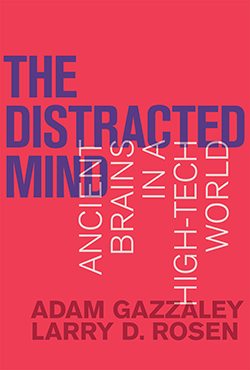Mindlessly Scrolling for Satisfaction
How to Navigate the Temptation of Distraction in the Information Age
By Charlotte LiebermanOn a Monday a few weeks ago, a friend of mine texted me to cancel our dinner plans scheduled for later in the week. I was instantly relieved—not because I had been actively dreading our plan, but because I, like so many of us, consistently feel too busy, overtaxed, and chronically stressed.
Who doesn’t want an unexpected free night at home?
A recent report from the Center for Creative Leadership related that American workers who own smartphones work 13.5 hours every day, and an average of 72 hours per week. If it’s really true that we have so little time to ourselves to just be, it is only logical that we would want some of it to be unstructured. Which brings me back to my banal story.
When Wednesday evening rolled around, I rode the subway home excitedly, ready for the surprise arrival of time to myself. Yet as soon as I could, I plopped on my couch, where I began mindlessly scrolling through my Twitter feed. Between scrolls, I intermittently opened the Safari app to check and re-check my Facebook (I deleted the app a year ago, an unsuccessful attempt to check it less). I wanted to see if anyone had liked my most recent status about how much I like pistachios and olives. I had no conscious intention in my mind during any of these actions, other than satiating a vague hum of desire for validation and a pesky impulse to feel less bored. Of course, my hour of idle phone time left me feeling anesthetized by the extra boredom I’d conjured, and a victim to it. A vicious cycle.
Over the past three years or so, this kind of mindless scrolling has become my habitual reaction to my regular need to “unwind” from long days of overstimulation and stress. Needless to say, many of the habits I—and we—develop in response to stress aren’t always the best. I don’t pretend to think otherwise, and have even written an article about the fact that my phone addiction became a quick replacement for my former cigarette addiction. Both smoking and scrolling enable me to scratch the itch to do something—anything—when I am faced with the scary prospect of just being.
Today, the driving forces that propel my apparent phone addiction are hard to name and explain, but they include things like: a deep and semi-conscious fear of being alone; a profound discomfort with the idea of not being in touch with “what’s going on” (some refer to this as “FOMO”—fear of missing out); a culturally-conditioned dependency on arming myself with my phone as a social protection of some kind. The list goes on.
Psychology and addiction experts alike have already begun debating the validity of “technology addiction.” There has been a prominent sense of doubt around naming the widespread tech-dependency most of us share as “addiction,” given the specific clinical criteria such a word carries. But the mere existence of this new area of research tells us that there’s certainly cause for developing wariness when it comes to our open-arms acceptance of our technology habits.

And, of course, there is an infinite well of harrowing data about our behavior to corroborate that. Did you know that Americans spend more time on email in the morning than we do eating breakfast? I also just learned from a recent poll in the UK that one in seven surveyed individuals have contemplated divorce because of their spouse’s unsettling social media activity.
The greatest irony of my technology habits is that I can’t seem to internalize the wisdom I glean experientially, time and time again: spending time on my phone when I feel bored or sad or lonely or empty does not make me feel better. Every time I do it, I feel like I’m watching myself from outside a window. I see myself mindlessly engaging with my phone—and feel how miserable it makes me—and I do it anyway. If I force myself to explain why, I attribute my behavior to a cultural problem that is beyond my control. Does my rationalization make me feel better? Absolutely not. But it does introduce the idea of how our culture feeds these behaviors.
Interestingly, the tug-of-war I experience between my rational mind and my habits is something that reflects a generation-wide phenomenon. A 2013 study from University of Southern California indicated that technology stresses out millennials more than those of any other generation—perhaps because so many of us fall prey to the instinctual dependency I am describing. Yet a 2014 study from California State University also reported that not being around our phones is a principle source of anxiety for millennials. We’re damned if we do, and we’re damned if we don’t. And so I ask: what would need to happen for me—for us—to shift these behaviors? And what is it about our culture that is helping to perpetuate this anxiety?
In their new book The Distracted Mind: Ancient Brains in a High-Tech World, psychologist Larry Rosen and neuroscientist Adam Gazzaley present a realistic—but notably not pessimistic—portrait of the ways in which current technology has affected our brains and behaviors. The book is grounded in the language of neuroscience to help show readers that our brains are simply unable to multitask, despite the myth of multitasking that the Information Age has attempted to impart on us.
 The real story, say Rosen and Gazzaley, is that technology induces “interferences” into our daily lives, which, given the omnipresence of phones and other devices, regularly interrupt the activity of the prefrontal cortex, the part of the brain responsible for goal-setting and most other cognitive controls. With each and every “alert,” we become distracted and newly fixated on the “interference” of the moment.
The real story, say Rosen and Gazzaley, is that technology induces “interferences” into our daily lives, which, given the omnipresence of phones and other devices, regularly interrupt the activity of the prefrontal cortex, the part of the brain responsible for goal-setting and most other cognitive controls. With each and every “alert,” we become distracted and newly fixated on the “interference” of the moment.
While Rosen and Gazzaley’s insights paint a somewhat scary picture of the way our brains react to technology, I found it strangely comforting to think about my brain as “ancient” and my behaviors as related to evolution. “We engage in interference-inducing behaviors because, from an evolutionary perspective, we are merely acting… to satisfy our innate drive to seek information,” say the authors. In other words, I scroll through Twitter like a zombie every night because my inner caveperson wants me to be well-informed so I can outlive everyone else in the Information Age. Right?
Perhaps, though no rationalization—no matter how “correct” it may be—feels like the answer to my genuine desire to get a grip on my technology use. Rosen’s emphasis on anxiety actually asked me to consider whether I thought technology itself is the issue here, or the current culture of technology. I believe there is a difference.
Technology itself isn’t a monolithic entity. There are apps, websites, games, media outlets, and more that reflect the dominant culture of tech—one that encourages distraction. Tinder’s “swipe” feature makes you want to keep swiping until you’re blue in the face, while Twitter’s infinite scroll function makes you feel like there is always more to see. It is the culture of technology that fuels our dependency on it by making us feel that there is always more. We have become chronically distracted as we hope second after second to find the missing piece of the proverbial puzzle—whether it be the best date prospect ever or the news story we’ve been looking for.
However, as Gazzaley and Rosen remind us, it is important to remember that our brains are ancient. We have the same brains we had before iPhones were ever invented, and the temptation of distraction—be it digital or analogue—is something we will always have to navigate. So how do we do that?
It is hard to break habits, especially considering that implementing rules for ourselves often can feel punitive or patronizing. I can’t say that I feel motivated to modulate my behavior if “No Twitter before bed!” has to become my new mantra. But a recent study shows a link between self-control and empathy; the part of our brains that allows us to “step into another’s shoes” is the same part that is responsible for self-restraint. An article in The Atlantic reporting on the study was titled, “Self-Control Is Just Empathy For Your Future Self.”
To me, reframing self-control as an act of self-care is a radical gesture, and one that makes me far more inclined to implement measures that help me control my technology habits.
Maybe I will try sleeping with my phone outside of my room and instead use a traditional alarm clock to wake myself up, to help me let go of the habit of nighttime scrolling. My future self would feel good about that.
My hope is that from there, I can put the phone down more often during the day, and shift my attention to something else. But if I don’t, I will also try not to berate myself, as releasing a habit is never easy.
Does that mean that tech companies bear no responsibility in helping us change the way we interact with our devices? Not at all. But I am a believer in the adage that the personal is political, and that systemic and structural issues can be at least partly addressed in each of our lives. And maybe your future self will feel better in the process.
Charlotte Lieberman is a Brooklyn-based writer and editor. You can read her prose in Cosmopolitan, Guernica, The Harvard Business Review, i-D, Marie Claire, BOMB, and Refinery29 and her poetry in The Boston Review, The Colorado Review, and Nat.Brut. Follow her @clieberwoman on Twitter, or at her blog www.fatfreebalsamic.com.
Images courtesy of unsplash.com

I found this doing exactly that so am conflicted. Smart and well done but I’m among the addicts
“Distraction is the only thing that consoles us for miseries, and yet it is itself the greatest of our miseries.”
– Blaise Pascal
I believe that training ourselves to reclaim and manage our own attention is the best approach a person can take to combat the digital attention crisis. In fact, I believe we can use the internet, even the ‘alerts’ themselves, to help us in this pursuit.
In the event you’re not guaranteed, there’s a superb online instructor Around The Hendon Mob
site.